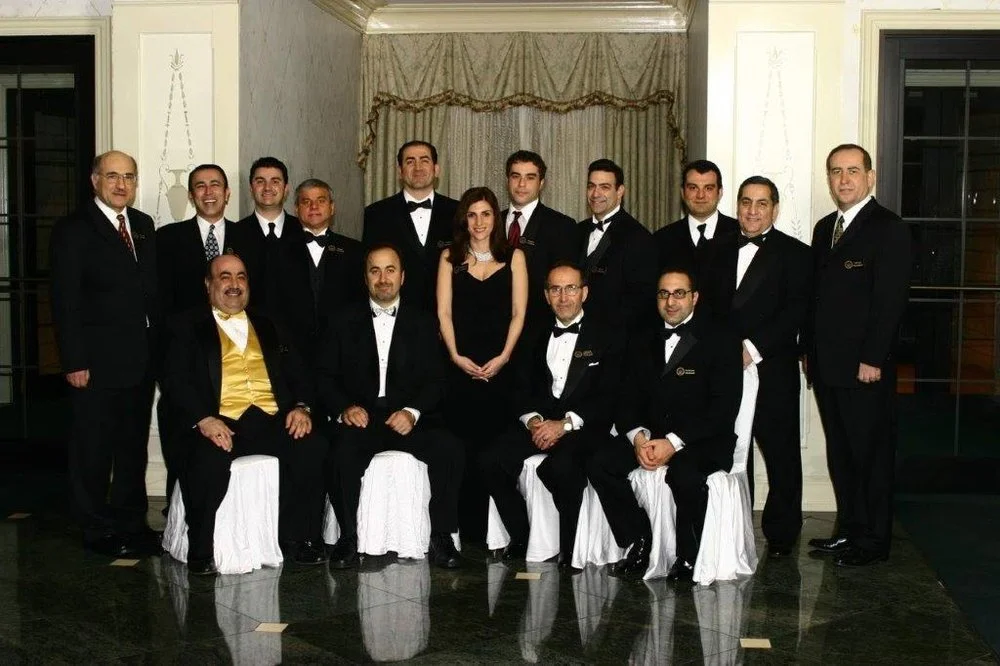Straight Outta 2003
The first CACC Board of Directors in 2004.
The Chaldean American Chamber of Commerce Celebrates 20 Years
By Sarah Kittle
In the year that Apple launched iTunes, the Human Genome Project was completed, and basketball legend Michal Jordan retired, the United States invaded Iraq without provocation.
Iraq was estimated to have nearly 1.5 million Christians before the 2003 US-led invasion that toppled dictator Saddam Hussein. Dating back to the first centuries of the religion, they include the Chaldean, Syriac, Assyrian, and Armenian Churches.
One thing is certain – Christian Iraqis bore the brunt of the war. They had near-equal rights with the Muslim majority under Saddam but were among the first groups targeted by extremists after the invasion.
Killings, kidnappings, and bombings became an everyday occurrence, sometimes with multiple bombings on the same day. This led to mass emigration – to places like Australia, Canada, Sweden, and the United States.
Chaldeans in Detroit
Chaldean Town, a segment of 7 Mile Road bounded by Woodward and John R., was established in the 1920s by Chaldean immigrants from Turkey and Iraq who wanted to work for the automobile companies in Detroit. After the 1967 Detroit riots and the downfall of the automobile industry, much of the area’s wealthy residents and business owners left, leaving the Chaldeans with a monopoly over certain businesses such as grocery stores.
Due to a steady stream of immigrants attracted to the already pre-established Chaldean community and the monopoly they had over certain industries, the neighborhood boomed in the 1970s, when many of today’s successful business owners were growing up. It was given the official moniker “Chaldean Town” in 1999.
When the aftermath of the 2003 invasion of Iraq left many Chaldeans no choice but to flee, this is where they came. By 2004, metro Detroit was home to the largest Chaldean diaspora community in the world.
Establishing the Chamber
The Chaldean American Chamber of Commerce (CACC) was born in March of 2003. At this point in time, the Chaldean community in Michigan had grown so large and had such influence that it was decided leadership and representation were necessary. Negative stereotypes perpetuated the idea that Chaldeans were opportunistic foreigners who cared little about the community they lived and worked in. Nothing could be farther from the truth.
A 15-member steering committee met and drafted the CACC bylaws, which state that the main purpose of the Chamber, among others, was to “provide trade, historical, and social information to the general public…and to create and promote better relationships between the American and Chaldean Assyrian Syriac business communities in the United States.”
It also aimed to help Chaldean Assyrian Syriac business owners handle problems and guide them toward self-resolution, to empower them, contribute to overall economic stability, and to serve as a unified voice for the entire community.
That’s a tall order.
The committee established a 15-member Board of Directors and designated Martin Manna as President of the Chamber.
20-year timeline
Within 5 years of its inception, the Chaldean American Chamber of Commerce had created a number of affiliates, including the Chamber PAC (2006), Chaldean Women’s Committee (2006) Chaldean Assyrian Syriac Council of America (2007), and the Chaldean Community Foundation (2008).
In 2008, United Way and Walsh College jointly conducted an Economic Profile & Census Survey of Chaldean Americans in metro Detroit, and in 2009, the first Chaldean Day was celebrated in Lansing.
From there, things started to accelerate quickly. 2011 saw the opening of the Chaldean Community Foundation (CCF) office in Sterling Heights, history was made in 2012 when Klint Kesto became the first Chaldean to be elected to Michigan legislature, and Mango Languages added a course on Sureth (a dialect of Aramaic spoken by Chaldeans) in 2013.
Two years later, in 2015, the CCF built a new home, a 16,000 square foot center of beautiful, storied limestone to serve the immigrant community. By 2016, dBusiness economists estimate that the Chaldean business community contributed $10 billion annually to the state of Michigan’s economy. That statistic certainly proved there were power brokers present.
With more exposure, the Chamber grew more powerful. In 2017, when ICE (US Immigration & Customs Enforcement) began deporting people, they turned to Manna and the Chamber for help. Working with politicians from both parties, House Bill 2537 (also known as the Deferred Removal for Iraqi Nationals Including Minorities) was introduced in 2019, halting the deportations and giving detainees more time to get their affairs in order.
In 2020, Chamber membership surpassed 1,000 members for the first time, only to rachet back down due to the COVID pandemic. Throughout the months of lockdowns and restrictions, the CACC served their members by providing information and sharing sources for relief funds, disseminating information, and sending updates when needed. Growth happened in other areas in 2020 as well, with the CCF center expansion and the addition of Ark Angel Fund, an angel investment group created to spark economic opportunities for investors and entrepreneurs alike.
In 2021, the CCF served a record number of individuals (50,000) and also broke ground on a $30 million affordable housing project in Sterling Heights.
To infinity … and beyond
So many things happened in 2022 to set the Chaldean American Chamber of Commerce up to serve the Chaldean business community for the foreseeable future. Two contractors in Nineveh were added to the Foundation staff and the “Product of Nineveh” partnership was created, an economic development initiative (EDGE) was put into effect, and Chamber plans to build a new west side campus began decisively moving forward.
To document all this growth, a new survey is being commissioned through Walsh College to assess the community’s current impact on the state’s economy.
Says Manna regarding the future, “We’re just getting started.”

